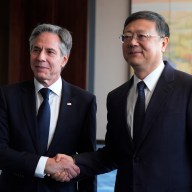 Australian actor Hugh Jackman arrives for the “Prisoners” screening at the 38th Toronto International Film Festival in Toronto last week.
Australian actor Hugh Jackman arrives for the “Prisoners” screening at the 38th Toronto International Film Festival in Toronto last week.
Credit: Reuters
Hugh Jackman says his new film “Prisoners” is more than just an “ambitious thriller.”
In his words, it’s “not just [a film] that grips you and keeps you on the edge of your seat, but one that actually makes you contemplate the themes for days after on many levels.”
He plays a father who takes to vigilante justice after his child is abducted. Directed by Denis Villeneuve (of the Oscar-nominated “Incendies”), it raises the question of whether Jackman’s character goes beyond the pale to get his daughter back or, alternatively, if he does enough.
“I can’t make up the mind of audiences,” he said. “I’m thrilled that Denis and Aaron [Guzikowski] wrote a script that forces that moral ambiguity. I think the film’s power exists in that.”
“I’ll tell you a little story about watching the film for the first time with my wife, who was holding my hand. I literally had nail markings in my hand as she gripped me, and then there were certain parts where she removed her hand from mine and I thought, ‘Oh, maybe I’m not sleeping in the marital bed tonight.’”
Jackman delivers a powerful, primal performance of a man on the brink. It’s work that drew praise from his co-stars.
“If you’re asking me if Hugh Jackman deserves an Oscar,” said Jake Gyllenhaal, “the answer to that question is absolutely yes.”
Co-star Terence Howard called Jackman “a sweet man,” but added that watching the actor’s strength of courage come through in the violent scenes was like “witnessing a man channeling all of this frustration,” not acting. “He deserves an Oscar.”
Jackman’s performance anchors the movie, which is unrelenting in its approach to telling the story.
“[The movie] is uncomfortable,” says Jackman. “You think, ‘OK, we’re going down this path with this guy and yeah, let’s enact some rightful justice.’ Then all of a sudden you feel uncomfortable and what that forces you to do is question, if you went along with him, why you so easily went with that way of thinking. It questions what you would do in that situation, and that’s where the film’s power lies.
“There is a reason we don’t just go to comedies,” he says. “Somehow as humans we also need to touch on real elemental fears that we push down every day of our lives, and collectively delve into and discuss it and feel.”
















